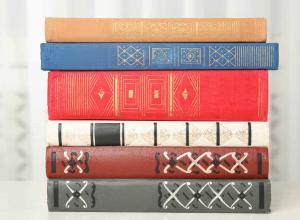Bibliotherapy: The Healing Power of Books
Talk therapy is nothing new, but how about bibliotherapy? I'm not talking about self-help publications, but rather using literature as a means to physical and psychological salvation. And really, who else but the French, the beneficiaries of a literary patrimony that dates from the 9th century, would be at the vanguard of such a movement.
Régine Detambel, award-winning author of more than thirty books and a Chevalier of Arts and Letters, is also a licensed physiotherapist, and she maintains that bibliotherapy, in some form or another, dates back to antiquity. Many of her books (La Splendeur, Opéra sérieux, Son corps extrême,) explore the aging process and how to live (and die) with grace.
As a writer and as a physiotherapist, she is a healer with her hands, and Detambel believes that literature can be found everywhere - in the air we breathe, in our bodies, and in the various liminal moments of our lives (birth, marriage, death).
"Everything is literature if we know where to look," Detambel graciously wrote to me, explaining bibliotherapy in detail: "I didn't create bibliotherapy. It existed in ancient Greece and Rome, and was revived after World War I to heal soldiers who had experienced psychological trauma at the front." Poetry and literature became part of her "creative bibliotherapy" (bibliocréativité as Detambel coined it), and has found immense success and personal satisfaction through her efforts.
"I think that working with the energy of an author, with poetry and metaphor, with stylistic and textual arrangements and so forth is extremely effective to revitalize the psyche," Detambel continued. "We are all beings of language, and so it is necessary to move and to shift the language that resides within us so that our efforts are rewarded positively." *

image provided by Régine Detambel
Detambel has played with the idea of bibliotherapy for as long as she has put pen to paper, but it was after writing a short story about skin (Petit éloge de la peau, Folio, Gallimard, 2006) that she recognized an analogy between skin and paper. "Books are caresses, in the strongest sense of the term!" she wrote.
Hosting daylong seminars from her hometown nestled in the southern region of Languedoc-Roussillon, Detambel teaches aspiring bibliotherapists -- nurses, doctors, psychologists, booksellers and librarians -- how books can help people better understand themselves and to reconnect with the world. "There's more to bibliotherapy than just handing a book to someone and leaving them alone.
There's a certain rapport between the text and the body that must be considered too. Even before one's eyes settle on the text, we must consider body posture, breathing, voice, and other physical considerations. I teach my trainees how to renew the dialogue between words and the body."

An invitation to learn about the healing arts with books. (image provided by Régine Detambel)
*All translations are my own.















